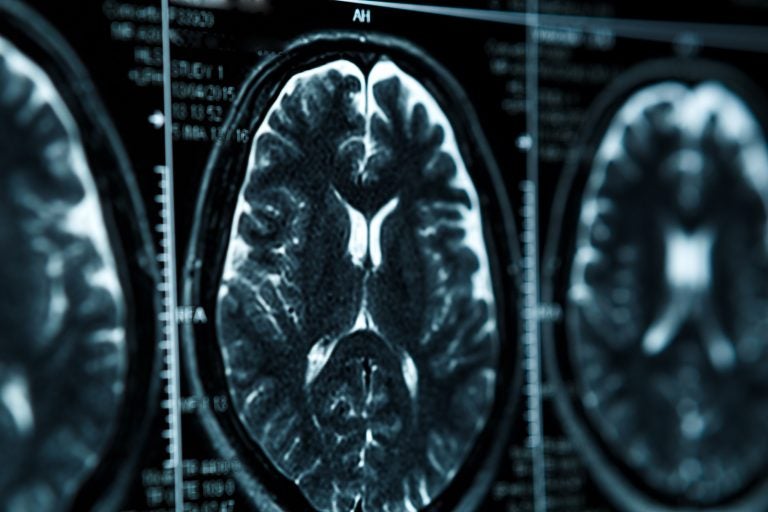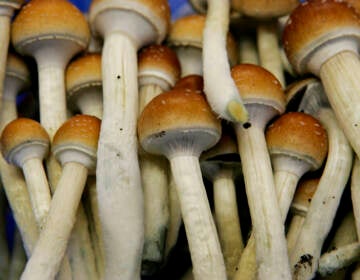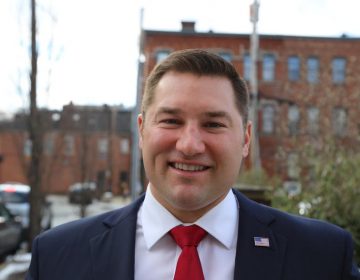New clinic plans to treat resistant PTSD with psychedelic drug
The Landing, which plans to open in Wyndmoor in the fall, hopes to get FDA approval to offer psychotherapy assisted by MDMA, also known as ecstacy.

(DedMityay/BigStock)
Updated 5:54 p.m.
A team of therapists, doctors and psychologists have plans for a clinic that would treat mental health conditions such as post-traumatic stress disorder using psychedelic drugs.
The Landing, which plans to open in September in Wyndmoor, Montgomery County, hopes to get Food and Drug Administration approval in the coming months that will allow it to offer MDMA-assisted psychotherapy for patients with treatment-resistant PTSD.
MDMA, or methylenedioxymethamphetamine, has been illegal since 1985 and is known informally as Ecstasy or Molly. It works to inhibit the uptake of serotonin in the brain in ways similar to Zoloft and Paxil, antidepressants that are approved to treat PTSD. Though MDMA has a reputation as a party drug, researchers have found that, in a controlled, clinical environment, it could work not only to treat but also potentially cure treatment-resistant PTSD.
Other successful methods exist for treating post-traumatic stress disorder. One review found, for example, that after undergoing prolonged-exposure therapy, 41% to 95% of patients lost their PTSD diagnoses at the end of treatment. But patient-dropout rates are high across the board, and there is a substantial group who are completely resistant to treatment. A third of people don’t respond to pharmacological treatment, and those drugs often come with side effects.
Plus, treating PTSD can be slow going because the premise of the therapy is a delicate one: Patients are often asked to revisit memories that elicit the same physical and emotional responses in the present moment as the ones they experienced at the time of the trauma.
Say someone is in a terrible car accident that inspires a fight-flight-or-freeze response typical of a traumatic experience. If that person then struggles with PTSD on an ongoing basis, it’s likely he or she is experiencing that response in daily life too, in a way that interrupts regular functioning — maybe nightmares, flashbacks, or avoiding certain triggering situations.
If that person sees a therapist who encourages revisiting the experience, chances are good it will trigger the same response.
“If you’re fighting or you’re fleeing or you’re freezing, you’re not very present,” said Mark DiFilippo, a Cherry Hill-based psychotherapist who uses a trauma-informed approach in his practice, and who is on the therapy team for The Landing. “There’s not that much that you can do in further developing the relationship between the client and therapist, much less finding new insights about or resolving the trauma that took place, because you’re in that state of self-protection yet again.”
That’s where MDMA comes in.
PTSD activates the amygdala, the fear center in the brain. That’s the biological mechanism causing the fight-flight-or-freeze response, making it hard to process or talk through the experience that caused the traumatic incident without the risk of retraumatizing. MDMA decreases activity in that part of the brain, making the experience that caused those reactions easier to access.
Here’s how the therapy would work: The drug is given alongside psychotherapy during a 12-week course of treatment. In each of the first three sessions, a patient meets with a pair of therapists for 90 minutes. Each therapist duo consists of one man and one woman, with the idea that many who suffer PTSD experienced some form of sexual abuse. MDMA isn’t administered until the third session and is given three times throughout the 12 weeks.
Each session with MDMA lasts roughly six to eight hours. A patient lies in a peaceful room with the therapists, who are there to guide him or her through the experience if necessary, and offer support if there is a negative experience.
When DiFillipo, the psychotherapist, saw the results of the Phase 2 clinical trials using MDMA to treat PTSD, he did a double-take, he said: They showed that after a cycle of treatment, 54% of participants no longer met the diagnostic criteria for PTSD. That number went up to 69% after a year.
“It was unheard of,” DiFillipo said.
The success of the Phase 2 trials won MDMA the green light from the FDA for Phase 3 trials, which are underway now in more than a dozen sites around the United States, Canada and Israel. The double-blind, placebo-based trials test MDMA against a control group for PTSD on patients for whom other treatment methods have been unsuccessful. Phase 3 trials are the last stage in a drug’s pathway to FDA approval. Researchers at Johns Hopkins University have also released recent research that shows MDMA may help with PTSD.
The national group sponsoring this research is called the Multidisciplinary Association for Psychedelic Studies, or MAPS. Brad Burge, its director of strategic communications, said the group hopes to have completed the trials, submitted the data, and have FDA approval as soon as 2021.
Meanwhile, the promising results of the Phase 2 trials also earned the treatment a “breakthrough therapy” designation, which means the FDA thinks the final trials are likely to succeed, and if they do succeed will be a significant medical breakthrough. The designation expedites the therapy’s development and prioritizes FDA review of the final trials.
Because of that vote of confidence, MAPS is hopeful that the treatment will be accepted as part of the FDA’s expanded access program, which gives provisional permission to use treatments that have not yet been approved but have shown significant progress.
The Landing is one of at least a dozen sites around the country getting its ducks in a row to apply to be an expanded-access site, pending MAPS approval from the FDA. Through that program, patients with treatment-resistant PTSD would be eligible to be referred by their doctors for MDMA treatment.
Phase 2 trials for MDMA-assisted therapy cost about $20 million, and Phase 3 clinical trials are expected to cost $26.7 million. MAPS is privately funded — the only public money it has received to date came from the state of Colorado to fund marijuana research for PTSD. Individual and foundation donors range from an anonymous cryptocurrency millionaire to natural soap giant Dr. Bronner’s, to the conservative Mercer Family, which has an ownership stake in Breitbart News and supported Donald Trump in 2016. The Mercer Family Foundation gave $1 million to MAPS to support veterans health.
According to the Department of Veterans Affairs, between 12% and 30% of veterans experience PTSD, and nearly 20 veterans die by suicide each day in the United States. There are more than 60,000 veterans in Philadelphia County alone.
Philadelphia VA spokesman Jonathan Hodges said his office could not comment on the treatment without guidance from the national VA since the therapy involves a controlled substance.
Ashleigh Adams, assistant director at the Stephen A. Cohen Military Family Clinic at the University of Pennsylvania, said her biggest concern with a treatment method like this is how patients would access it — both financially and logistically.
Research on PTSD is definitely trending toward longer and fewer sessions, Adams said, but that can be very hard for patients to manage, pragmatically. The Penn clinic provides telehealth services to improve access, and it is grant-funded to treat patients who are uninsured, she said.
“I doubt that insurance companies would be interested in reimbursing for this any time soon,” she said in reference to MDMA-assisted therapy.
Adams was also concerned that the ability of MDMA or any medication-assisted therapy to allow patients to confront their trauma might make the patients feel as if that is the only way they will able to access those difficult experiences emotionally.
That said, Adams added that she was impressed by success rates in the Phase 2 clinical trials, especially given that those rates increased a year out from treatment.
“If symptoms truly are going down, something must be going right,” she said. “It really could change the way we think about this.”
This is the first time MDMA has gone through rigorous research, but it’s not the first time it’s been used in therapy. For about a decade during the late 1970s and early ’80s, it was used in couples therapy, in some addiction treatment, and for anxiety, as well as to treat some cases of PTSD.
At that point, MDMA was still legal. While LSD was criminalized in the late 1960s, followed by psilocybin mushrooms in 1970, MDMA wasn’t added to the Controlled Substances Act until 1985, at which point it became impossible to do legal psychotherapy work using it and it gained its reputation primarily as a party drug. As a Schedule 1 drug, MDMA is considered to have no medical benefit.
Samy Badawy, a surgical dermatologist who is also on The Landing team, estimated it would cost about $7,500, for a full course of treatment per patient. (To be considered for expanded-access designation, each site needs a physician who can apply for the DEA Schedule 1 license). Until a site received FDA approval, the treatment would not be covered by any type of insurance.
The Landing plans to host a fundraiser Wednesday to raise money for those who can’t afford the treatment.
The therapy team at The Landing says it hopes to open in September, regardless of whether it has been granted expanded-access status for MDMA therapy.
It will start treating patients with the psychedelic ketamine, which is legal for treating depression and hopes to be ready to see the first MDMA-assisted therapy clients as early as the first quarter of 2020.
—
This article was updated to include comments from the assistant director at the Stephen A. Cohen Military Family Clinic at the University of Pennsylvania.
WHYY is your source for fact-based, in-depth journalism and information. As a nonprofit organization, we rely on financial support from readers like you. Please give today.





